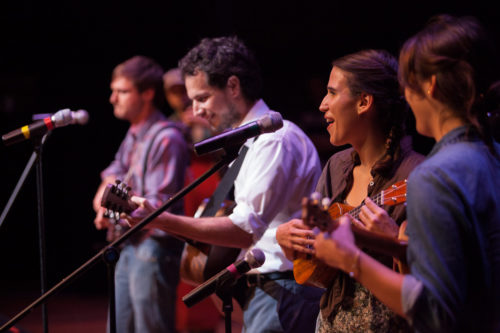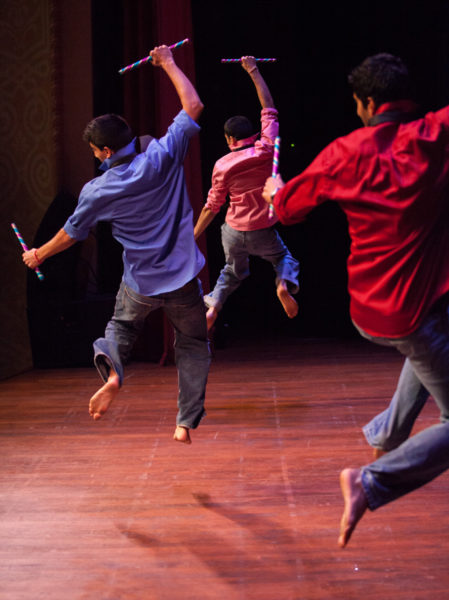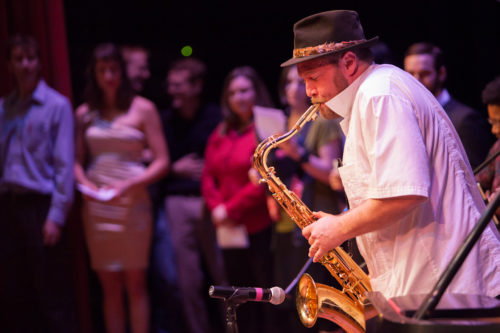Students help secure medical assistance for Galveston’s working poorPosted Mar 14, 2012 |
|

The Springtime Chicken Family Band performed "Wagon Wheel" by Old Crow Medicine Show. Photo/Joshua Kamnetz
[Diocese of Texas] Who knew medical students were so talented? On March 8, University of Texas Medical Branch students held their annual fundraiser for the St. Vincent’s House Student Clinic in Galveston. They reached deep to deliver an extraordinary talent show for the free clinic, which serves all of Galveston County and operates 12 hours a week under the direction of medical students. Students also hold regular mobile clinics throughout the year.
The talent show took place at the Grand 1894 Opera House, and included a bluegrass band, a tap dancer, a Bollywood dance number, gymnastics, a rapper, a flute choir, an a capella choir and several piano numbers. Between acts, the audience won door prizes donated by Galveston businesses and members of the community.
Raising more than $5,000, this year’s talent show was the most successful in recent memory, according to organizers. Funds are used for medications, office supplies, stericycle (disposal of medical waste) and food for volunteers. Other funding for the clinic comes from several medical departments at UTMB, individual donations, awards and grants.
In 2011, students volunteered more than 9,000 hours at the clinic, and UTMB faculty added another 1600 hours. Every clinic requires at least one physician present. With many families in Galveston unable to afford health coverage, the free student clinic serves an important role in community healthcare.
“We absolutely fill a great need in the community,” said Alyssa Shell, one of 11 student directors for this school year. “At one point UTMB had more money to use on indigent care, but now we get referrals from departments at UTMB and the ER when people can’t afford regular services.”
However, the student clinic has limited resources, and Shell pointed out that it is not a great place for someone to receive regular care. But many times, the student clinic is the only place people can go.
“We want to meet as many people’s needs as possible,” Shell said. “We try to find funding for these patients when possible.”
In addition, the clinic serves as a unique training environment for medical students. Typically, the clinic is run by several student directors in their fourth and final year of medical school. Younger students volunteer under the tutelage of older students and physicians.
“As a student, you can take as long as you want in your patient report,” Shell said. “It’s a lower stress environment with more room for patient-centered care. We don’t have to worry about reimbursement. We just do the best we can to meet the patient’s needs in the most effective way.”
Additionally, the experience of working with underserved populations gives students an important insight into the needs of the greater community.
“It is much harder to ignore the barriers to good health,” Shell said. “We forget how difficult it can be for people to take care of themselves. Crises come up regularly. You know, your car breaks down or you can’t find transportation to your appointment. As a care-provider, you become much more aware of these challenges. It requires a deeper understanding of what it is to be human.”
St. Vincent’s House is a non-profit Jubilee Ministry of the Episcopal Church. The social service agency provides community outreach programs for the disadvantage, underserved and working poor. SVH was founded in 1954 as an outreach ministry of St. Augustine’s, Galveston.
“The clinic is one of our core ministries,” said Michael Jackson, executive director of St. Vincent’s House. “It is extremely important to what we do.”
The Student Clinic shares space with St. Vincent’s Hope Clinic, a nurse-managed clinic working to become a Federally Qualified Health Center. To learn more visit stvhope.org.
— Luke Blount is staff writer and communications specialist for the Episcopal Diocese of Texas.



Social Menu